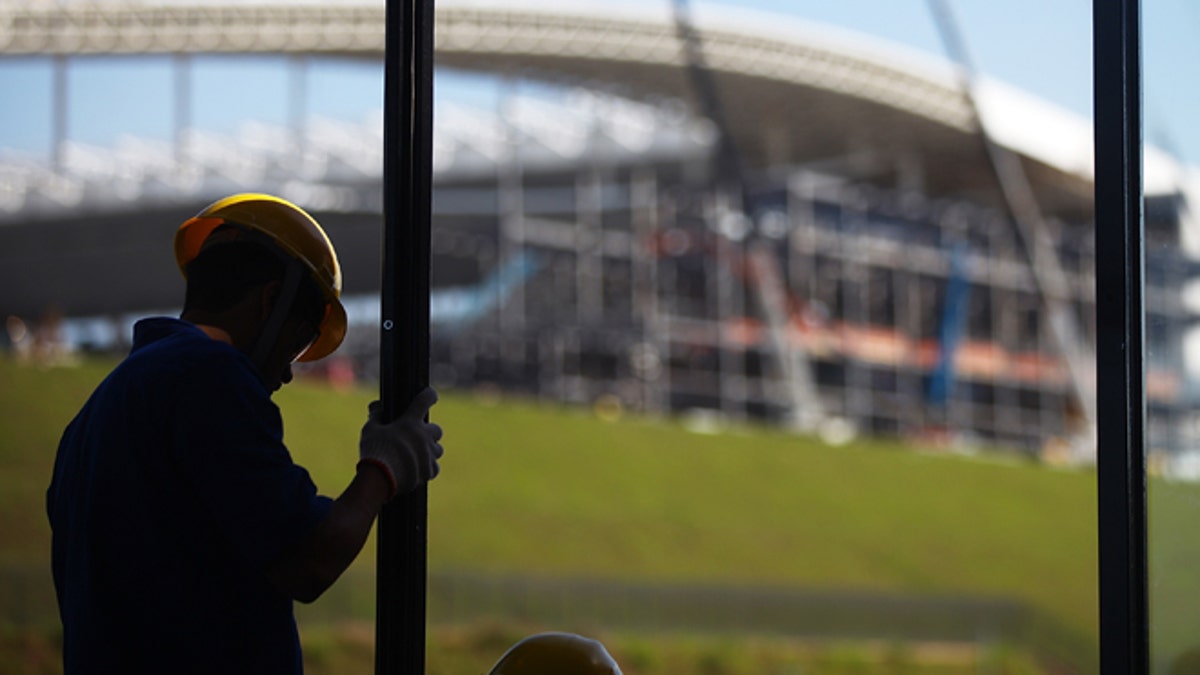
SAO PAULO, BRAZIL - APRIL 29: Construction work continues on an access walkway to the Itaquerao stadium, also known as Arena de Sao Paulo and Arena Corinthians, on April 29, 2014 in Sao Paulo, Brazil. The stadium is scheduled to host the opening World Cup match on June 12 between Brazil and Croatia. Some 20,000 temporary seats are being constructed behind the goals to boost the seating capacity to nearly 70,000. (Photo by Mario Tama/Getty Images) (2014 Getty Images)
After the historic and heartbreaking 7-1 loss Germany handed host nation Brazil on Tuesday, the last thing Brazilians probably want to hear about is another big loss.
This one to their pocketbooks.
We know that it won't be a Brazilian hoisting the World Cup trophy in triumph come Sunday, but Brazilian President Dilma Rousseff is dearly hoping that the country can still come out on top financially.
Public spending on stadiums and other Cup-related infrastructure projects - estimated at $11.3 billion - was met with widespread unrest and protests in the 18 months before the start of the Cup.
An economic upswing was one of the things that lawmakers touted to the Brazilian public that was supposed to make hosting the Cup – as well as the 2016 Summer Olympics, which is officially expected to cost another $2.3 billion – worth the investment.
Most analysts and economists, however, agree that the tournament will probably wind up being anything but a moneymaker.
“There will be a short-term input from the huge increase in tourism and related consumer spending,” Cynthia Arnson, the Latin American director at the Woodrow Wilson International Center for Scholars in Washington, D.C., told Fox News Latino. “Once the Cup is over, however, the long-term structural problems will remain.”
Despite the protests ahead of the Cup's opening match in Sao Paulo, Rousseff's approval ratings have improved slightly during the tournament. But with a presidential election looming in October, the public’s skepticism over the benefits of hosting the World Cup will loom large.
In a poll taken by Gallup in May, 55 percent of Brazilians believed the Cup would hurt the Brazilian economy. For the first time since 2006, the poll also found, Brazilians are more likely to say economic conditions in the country are getting worse.
Brazil may be the region's economic powerhouse, but it struggles with immense poverty and astronomical crime rates.
Brazilian Minister of Sports Aldo Rebelo said the tournament could pump $90 billion into the economy over the next 10 years. FIFA has suggested that the 12 new or refurbished stadiums across the country being used for the Cup will be big draws for the local club teams that wind up using them.
“It is not unusual for [pro] clubs to find that the provision of a bright, new, clean and comfortable stadium brings with it a dramatic increase in attendance levels,” FIFA stated, according to SportsNet.
Analysts claim that Rebelo's figure is a bit far-fetched, especially given that the estimate for the 15-year economic impact of the 2006 World Cup, held in Germany, is under $5 billion and that the actual revenues for the 2010 Cup in South Africa have been closer to $500 million than to the $900 million initially reported.
And some of the stadiums promise to become the white elephants of this World Cup.
While the Maracanã in Rio will see use year-round and during the 2016 Olympics, and São Paulo’s Itaquerão stadium will be the new home of the popular Corinthians club, stadiums like Manaus’ Arena da Amazonia, which has room for more than 40,000 spectators.
After the Cup, it will house the division-four soccer team, Nacional Futebol Clube, which draws about 1,500 fans per match. Beyond the cost of construction (and the incurred debt), it’s unclear who might be able to cover the $250,000 monthly maintenance if the government can’t find a corporate buyer for the stadium.
“That is not a driver of economic development, that’s consumption,” Christopher Sabatini, a senior director at the Council of the Americas, told Fox News Latino about the stadiums. “Brazil needs to compete better, and this is not going to do anything for them.”
The money thrown into the event has rankled even some of Brazil’s soccer greats who believe FIFA, not Brazil, will be the clear winner. The world's soccer governing body is set to make some $4 billion in revenue from the 2014 Cup.
“Off the pitch, I think Brazil has already lost the World Cup because so much money has been thrown away,” Brazilian soccer star-turned-congressman Romario said, according to SportsNet.
Analysts like Sabatini believe that the country's economic future should not be based on a soccer tournament.
“This was intended to be Brazil’s coming out party,” he told FNL.
Instead it's looking more like a funeral.
